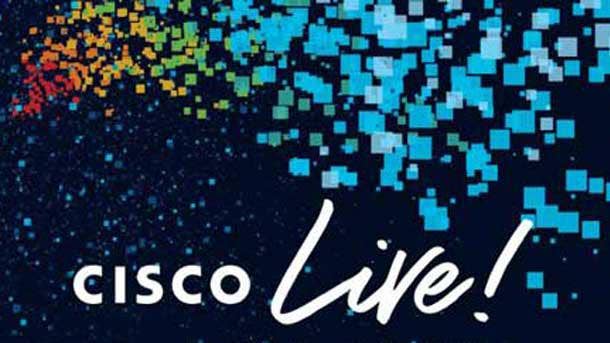Cisco’s Oliver Tuszik: ‘We Need Partners’ To Be Successful With Consumption-Based IT
‘Don’t focus on Cisco being your competitor -- that’s stupid. We need our partners to be successful. Focus on the competition that you have in the market from [other partners],’ Cisco Channel Chief Oliver Tuszik says in a message to partners.

Partners ‘Driving And Defining’ The New World
Cisco has been on a path to transition the majority of its portfolio to an as-a-service model for the past several years, but it’s fair to say that 2020 and the impact of a global pandemic accelerated the need for flexible, consumption-based IT. With that in mind, Cisco Plus — the company’s formal strategy to address the new ways of buying and consuming its hardware, software and services — was unveiled at Cisco Live 2021.
Partners have always been key to Cisco’s success, but the tech giant is leaning on them more than ever to satisfy the new buying behaviors it’s seeing from customers around the world, said Oliver Tuszik, senior vice president of Cisco’s Global Partner Organization. At the same time, there’s plenty of room for partners to do what they do best: advise and help businesses make the necessary adjustments needed for a safe return to work, while also keeping in mind that teleworkers will continue to be a big part of the equation.
Partners, Tuszik said, aren’t waiting for the new normal or the post-COVID-19 world. They are already “driving and defining” it.
Channel Chief Tuszik virtually sat down with CRN during the Cisco Live 2021 digital event to talk as-a-service, address concerns around competing with partners, tangible ways that partners can help their customers adapt to the new normal, and where partners should invest to continue to build their own businesses.
Here’s what Tuszik had to say.

How will Cisco be relying on the channel to help with its as-a-service transition?
Cisco Plus is bringing [everything Cisco is working on] together. As-a-service, most of our partners still call it managed services. The buying behavior has changed, and there are different buying centers. So, it’s not like we’re coming up with a new idea. We continue to serve the increasing demand. What we did with Cisco Plus is we took it to the next level. As-a-service service or managed services, it’s something we’ve done for at least 10 years, maybe even longer. And it’s a growing business. We have done $5.3 billion [in managed services in FY 2020] with our partners and we will continue to evolve the next steps.
Cisco Plus offerings are easier to be integrated or to sell as a managed service, but under Cisco Plus, there are a lot of new platforms that we’re developing. Platform that allow you to create a completely different experience that helps you to build different consumption models and it’s happening on different layers, so no matter if you’re an experienced MSP, you will get better products, better APIs, and better integration. If you’re new to managed services, you will get close to ready-to-sell solutions where you only need to do certain activities on your side. The key is, our as-a-service strategy is 100 percent partner-focused, and this hasn’t changed -- this is nothing new.

What do you say to concerns that as-a-service offerings could compete with partners?
The answer is a simple no, we don’t compete. Whoever is afraid of Cisco as a competitor is looking at the wrong side. We will always have a partner-focused approach. We are still on a similar level that we’ve been on for years.
The important thing is, as-a-service requires somebody who’s delivering and handling all the components and bringing it together in a managed service. Will there be services that might no longer be of value for partners? Sure, this has been happening since I’ve known Cisco, at least. It is a continuous process. But if you look at the classical hardware business that is still existing, but it’s very difficult to make a high margin on this kind of business. This is why partners are moving on to developing higher-end services, with more focus on the lifecycle. This process will continue and will be accelerated with as-a-service and managed services.
Don’t focus on Cisco being your competitor -- that’s stupid! We need our partners to be successful. Focus on the competition that you have in the market from [other partners].

How is Cisco thinking about helping the channel address customer needs in a post-COVID-19 world?
After COVID times, there will be a kind of better new normal [and Cisco has been] talking about how we create a more inclusive future. How can we ensure that the new normal is better than the old normal, and how can technology help create a new environment that is more inclusive, which allows people to participate. I really love what we’re doing currently with our collaboration approach with the new features and devices -- it’s just amazing.
I’m seeing that people are starting to adapt to a new way of working together, which is closer to this hybrid working environment. I don’t believe that we’ll have a lot of big meetings were there won’t be any attendees located in home offices anymore. How do we create the same kind of experience and ensure that [the meeting] is not dominated by a small group and everybody can add their value [and] feel included? In all the activities we are doing, there’s a technical part, but it’s also how we work together with our employees and how we help our partners.

Where can partners play a role in helping their customers become more inclusive?
The role of the partner is very clear. They need to support and help the customers find their new normal because there’s not one definition and everyone’s starting from a different place. How we supply the innovation is one important part, but it’s the partner who helps [the customer] find the right setup. We see a lot of partners building on top of the Webex platform and the contact center, which has become more and more important in this virtual, digital world.
[One partner] took a Webex solution and added it on top of a robot to do house tours in times where it’s pretty difficult to visit houses. In the end, they just took the Webex capabilities and added their strengths and ideas to the solution. That’s a lot of great innovations with clear customer value. And this is where it where the future is. Partners are not waiting for the new normal -- They’re driving and defining it. They are the ones that are closest to the customers. They’re coming up with the ideas and with the new solutions that are allowing us to turn innovation into real value.

What partner program changes has Cisco made to help the channel embrace new buying trends?
We’re changing all our programs and the logic of how we incentivize partners we work with. We announced this piece more than a year ago, but we were looking at partners and [labeling them as] system integrators, or advisors, but now, we’re making very clear that you might have different sales forces and we give you all the chances to work in the sales motion best for you. We had a lot of big partners say they’ve invested so much in their Cisco certification and teams, so if we changed everything, who is protecting their investment? So, we took care to take the investment they made and protect them and migrate them into the new world. This is working pretty well.
On the other [hand], we’ve changed the programs because there’s a change in the demand. It’s not because we love to change programs, it’s because we want to serve our customers better, with the best partners. The new programs will have a much higher focus on lifecycle and customer success. If there’s any partner who believes they can ignore what happens after they sold the product, it will become more and more challenging. The programs support the new or different routes to market. We’re supporting more of the companies that are consulting or advising partners because they are key in this complex world.
The DevNet community, too, is getting to the next level. It’s not only about developing on top of our platforms and APIs, but it’s about how to enable a software-centric world. Software skills are becoming even more essential, especially when we’re talking about a cloud-first, application-centric world. The programs are running really fast now into the new mode, and the problem is that partners are asking us to move faster. Of course, we will not be able to migrate everybody on the first day, and normally we do a pilot, but we have so many candidates that we can’t call it a pilot any longer, but we see the huge interest in the provider program, which is how are we enable more as-a-service and managed services. I think partners appreciate that we are taking a look at the value they’re generating whilst we’re trying to reduce the effort for becoming a certified cisco partner. Just to be very clear, we’re not planning to reduce the threshold because we want the best partners to be called Premier or Gold, but we want to take out any kind of effort that is not creating value, and that’s what the teams are working on.

How big is the opportunity for partners around APIs?
Look only at Cisco. Our portfolio become much wider and broader and the IT world overall is becoming more complex -- we’re talking about hybrid and multi-cloud, and security challenges. So, the integration and creating a simpler package is more and more important. You’re focused no longer on just getting the different parts working together, you’re focusing on the experience that the customer or end user wants to see, and that’s normally far away from technology -- it’s more about, ‘How do I manage my vaccination process?’ for example. APIs are the key to help our partners to do the integration and create the experience.
The easier we make it possible for [partners] to develop on top of our platform, the more they will utilize it and the more they will decide to build their future solutions on top of Cisco. We have a unique advantage, which is the install base. Nobody in this environment has this installed base like Cisco has, so the scale is already there. We need to ensure that it becomes easier and easier to develop on top. We’re leading in this area with Meraki. Meraki is the platform that our partners, but also a lot of independent software companies, are using to build solutions on top. The same is happening with Webex right now and we need to ensure that it doesn’t matter what part of the portfolio you’re using, but that you have a standard set of APIs. And by the way, this is really important for managed services -- a highly standardized set of telemetry information. [It’s about] how to operate and manage these kinds of platforms in a highly standardized way. We want to be the standard for as-a-service in the network infrastructure space.

What’s the message you want partners to take away from Cisco Live this year?
There has never been a better time to be a Cisco partner. Because, first of all, we are bringing out the solutions that helps them deliver incredible value that serves changing customer demands. The reason why I say it’s never been a better time is because the need for partners that have the capabilities to create integrated solutions to deliver the unique value in different motions, whether it’s a classical sales motion, or the as-a-service motion, the need has never been higher. If you’re investing in this area and have the chance to double down on as-a-service, or customer experience, you will have long-term, predictable, profitable growth. When you look at the role of the partner, it’s clearly becoming more important. But only if you’re ready to continue to develop your capabilities and stay close to customer needs and buying behaviors. The chance to kind of relax with a great solution that you sell for two years without doing any big changes is more or less gone, forget it.